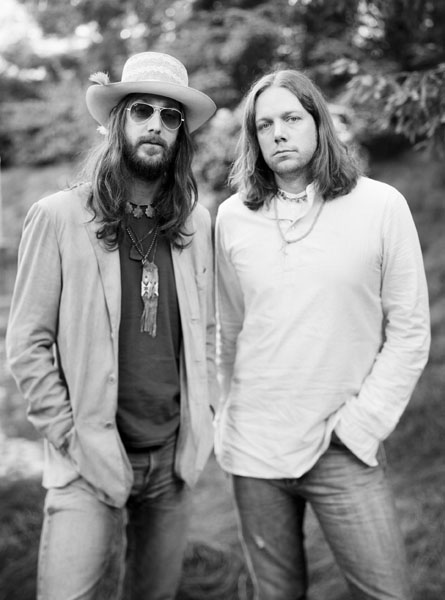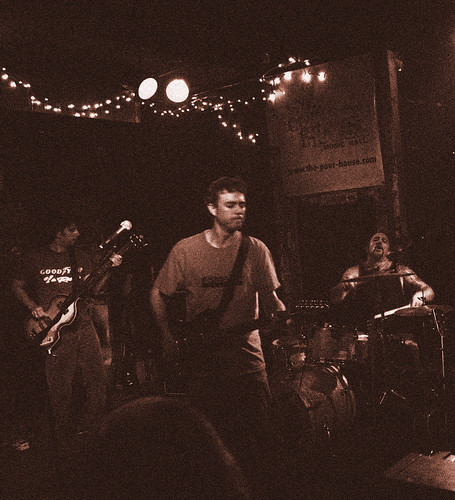
In this performance, recording exclusively for iTunes, the Crowes unplug; in fact, if I'm not mistaken, the full Crowes aren't in the studio here--it's just the brothers Robinson, both on guitar, Chris (pictured above on the left) singing lead with Rich providing tight, upper-register harmony on the chorus. The Robinson brothers take this shopworn soul/country classic* in slow Southern stride, highlighting not only Chris Robinson's soulful voice, but also Rich's deep-hearted plucking. The recording brings to mind not only of the sad, regretful tale in the lyric, but of singer-songwriters in general.
Mostly, I don't care for that subgenre of rock/pop, mainly because the songs are mostly either too mopey or too whimsical, without much sense of humor or soul or inventiveness. Hearing 'em live, though, in an intimate setting, can make for a much more spiritual experience. The physical distance between entertainer and audience is much shorter, much more compact, and thus the we, the audience, feel emotionally/spiritually closer to the entertainer because we are closer physically. It's easier to make a connection. Depending on how compact the space, often the audience can hear the entertainer sing/play without need of amplification, and the entertainer seems that much more human, more like us, more like a comforting friend than would be the case in an ampitheater or a stadium, where the physical distance is so vast that the emotional artist-to-fan connection has to suffer some (but don't go tell that to Widespread/Dead heads or Phish fans, though), and the overamplified instruments surely don't help matters (and don't tell that to KISS fans, either).
Now, I'm not saying that acoustic/unplugged performances are better or more real, nor am I saying that coffee house gigs are more fulfilling than arena tours; I'm stating that for the fans that feel they need they need to feel emotionally close to their favorite artists, then, well, singer-songwriters (and folk artists, too) performing live, with as few loud instruments as possible, as close to the audience as possible is the way to go. It's not my way to go, though. It's been my personal experience that much more often than not, these types of honest performances, close-up, with acoustic guitars, leave me trying my best either not to groan at the singer's vapid (at best) lyrics or not to stifle laughter at the singer's voice. I've heard too many of these types of performances late at night at the Neshoba County Fair sitting around the porch of someone's cabin. ** Sure, these troubadours sing earnestly and have only the most sincere of artistic intentions, but good googly-moogly, the music and lyrics are enough to make one convert to the Church of Christ. The only similar type of communal experience worse is attending a poetry reading. And that's a story for another day.
I need to note that what the Crowes do here, though, is the exception to my rule of avoiding these types of performances. One--and this is the most important reason--they've got an exceptional singer, and two--they've got a great song to sing. Most don't.
NOTES
*Stax soul singer William Bell wrote and originally sang "You Don't Miss Your Water" back in 1961, and it was his biggest hit. Four years later, Otis Redding covered it on record, and that's the version I'm most familiar with, as my dad had several Otis records he played repeatedly when I was a youngun. In '67, the Byrds recorded it as a track on their seminal (and countrified) Sweethearts of the Rodeo album. Those three versions are the most famous of this song, but it's been recorded dozens of other times, by country, rock, and soul singers alike.
**The musicians I speak of here are the ones who play and sing with earnest intent. The comic ones I'll talk about next week.













